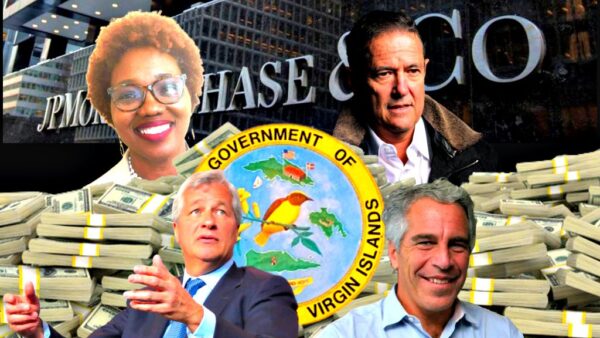US Virgin Islands Versus JPMorgan Chase: Judge Allows Bank To Argue the Affirmative Defense That Territory Government Has ‘Unclean Hands’ Due to Its Own Jeffrey Epstein Ties
US Virgin Islands Versus JPMorgan Chase: Judge Allows Bank To Argue the Affirmative Defense That Territory Government Has ‘Unclean Hands’ Due to Its Own Jeffrey Epstein Ties

A lawsuit is raging in Federal Court in New York, pitting the government of the US Virgin Islands territory against America’s largest bank, JPMorgan Chase.
But while the bank has agreed to settle a parallel suit by Epstein trafficking victims for a value said to reach $290 million, it has stood its ground and put forward ‘affirmative defenses’ stating that the USVI has ‘unclean hands’ because of its own ties to Epstein, and therefore could not seek damages in court.
Read more here:
On his lastest decision, judge Jed Rakoff denied the USVI request to block JPMorgan Chase’s ‘unclean hands’ defense.
The St. Thomas Source reported:
“JPMorgan Chase may employ affirmative defenses against the V.I. government’s lawsuit that alleges it aided and abetted Jeffrey Epstein’s sex-trafficking scheme, a judge has ruled, while also expressing skepticism that the bank’s strategy will succeed.”
The V.I. Justice Department asked the court to strike this line of defense that alleges the USVI is equally culpable in Epstein’s crimes, having given his companies millionaire tax breaks and ‘actively facilitating and benefitting’ from his activities.
The Judge Jed Rakoff ruled against the USVI government but also expressed some overall skepticism about JPMorgan’s defense.
“’The Court has received extensive briefing and oral argument on the motion. After full consideration, the Court denies the motion’,” Rakoff wrote in his order. ‘Although the Court is skeptical that some or all of the defenses will survive summary judgment (let alone prevail at trial), the Court is satisfied they should not be stricken as a matter of pleading. An opinion setting forth the reasons for this ruling will issue in due course’, he said.”
The USVI claims JPMorgan violated the federal Trafficking Victims Protection Act in its services to Epstein, and is seeking some $190 million in damages.
Read more here:
The Virgin Islands Attorney General’s Office has argued that it is acting in ‘a public enforcement capacity’, and that affirmative defenses are not permitted in cases brought by sovereign entities such as a territorial government.
The bank alleges that the USVI government awarded Epstein’s companies lucrative tax benefits through the Economic Development Authority and turned a blind eye to his misdeeds as he contributed to local Democratic political campaigns.
“’For two decades, and for long after JPMC exited Epstein as a client [in 2013], the entity that most directly failed to protect public safety and most actively facilitated and benefited from Epstein’s continued criminal activity was the plaintiff in this case — the USVI government itself’, the bank said.”
The USVI has charged JPMorgan with ignoring the growing evidence of Epstein’s crimes and ‘trading victims’ public safety for its own profits’.
“‘After the Court denied its motions to dismiss, JPMorgan answered the Government’s Complaint in part by trying to deflect blame and distract attention from its own conduct through affirmative defenses based on equitable and fault-shifting doctrines […] In its Opposition, JPMorgan doubles down on its efforts to distract and deflect.”
It is often said that a trial is won or lost in the pre-trial motions, and it seems to be the case at play, here. The oral arguments on the motions is scheduled for Aug. 18, while the case itself is scheduled for trial on Oct. 23.
BNN reported:
“JP Morgan has fought back against the allegations, arguing that the government of the U.S. Virgin Islands had a long-standing and profitable relationship with Epstein. The bank states that the government approved numerous business and economic deals benefiting Epstein, making it complicit in his affairs. The bank also argues that the government ignored Epstein’s criminal activities while they continued to profit from his investments.
[…] The ‘unclean hands’ defense is a legal doctrine that implies that a plaintiff cannot sue if they have acted unethically or have been a part of the wrongdoing in relation to the subject of the lawsuit. In this case, JP Morgan asserts that the USVI government was involved in Epstein’s activities, and therefore, it cannot sue the bank for its involvement.”
The post US Virgin Islands Versus JPMorgan Chase: Judge Allows Bank To Argue the Affirmative Defense That Territory Government Has ‘Unclean Hands’ Due to Its Own Jeffrey Epstein Ties appeared first on The Gateway Pundit.
Go to Source
Author: Paul Serran

